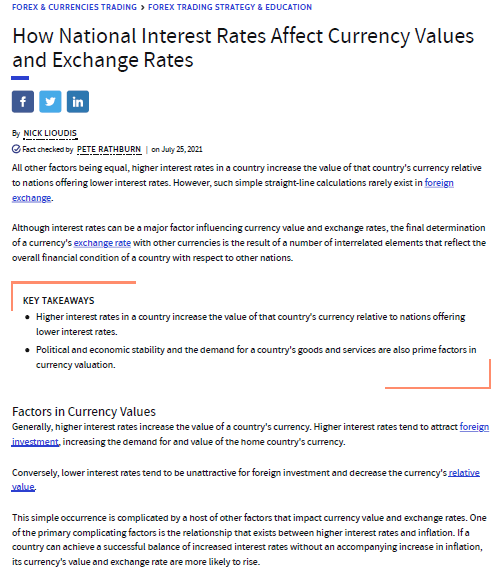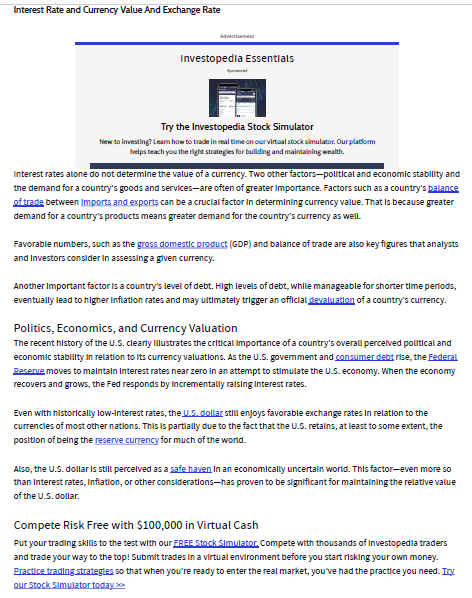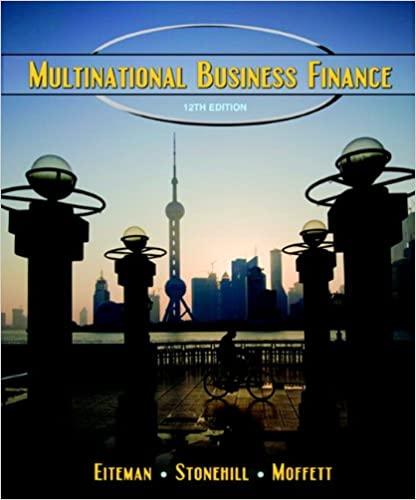Answered step by step
Verified Expert Solution
Question
1 Approved Answer
I need a summarization for this reports please.. FOREX & CURRENCIES TRADING > FOREX TRADING STRATEGY & EDUCATION How National Interest Rates Affect Currency Values


I need a summarization for this reports please..
FOREX & CURRENCIES TRADING > FOREX TRADING STRATEGY & EDUCATION How National Interest Rates Affect Currency Values and Exchange Rates fyin By NICK LIOUDIS Fact checked by PETE RATHBURN on July 25, 2021 All other factors being equal, higher interest rates in a country increase the value of that country's currency relative to nations offering lower interest rates. However, such simple straight-line calculations rarely exist in foreign exchange. Although interest rates can be a major factor influencing currency value and exchange rates, the final determination of a currency's exchange rate with other currencies is the result of a number of interrelated elements that reflect the overall financial condition of a country with respect to other nations. KEY TAKEAWAYS Higher interest rates in a country increase the value of that country's currency relative to nations offering lower interest rates. Political and economic stability and the demand for a country's goods and services are also prime factors in currency valuation Factors in Currency Values Generally, higher interest rates increase the value of a country's currency. Higher interest rates tend to attract foreign investment increasing the demand for and value of the home country's currency. Conversely, lower interest rates tend to be unattractive for foreign investment and decrease the currency's relative value This simple occurrence is complicated by a host of other factors that impact currency value and exchange rates. One of the primary complicating factors is the relationship that exists between higher interest rates and inflation. If a country can achieve a successful balance of increased interest rates without an accompanying increase in inflation, its currency's value and exchange rate are more likely to rise. Interest Rate and Currency Value And Exchange Rate Investopedia Essentials Try the Investopedia Stock Simulator New to investing? Learn how to trade in real time on our virtual stock simulator. Our platform helps teach you the flight strategies for building and maintaining wealth. Interest rates alone do not determine the value of a currency. Two other factors-political and economic stability and the demand for a country's goods and services are often of greater Importance. Factors such as a country's balance of trade between Imports and exports can be a crucial factor in determining currency value. That is because greater demand for a country's products means greater demand for the country's currency as well. Favorable numbers, such as the gross domestic product (GDP) and balance of trade are also key figures that analysts and Investors consider in assessing a given currency. Another important factor is a country's level of debt. High levels of debt, while manageable for shorter time periods, eventually lead to higher Inflation rates and may ultimately trigger an official devaluation of a country's currency. Politics, Economics, and Currency Valuation The recent history of the U.S. clearly Illustrates the critical Importance of a country's overall perceived political and economic stability in relation to its currency valuations. As the U.S. govemment and consumer debt rise, the Federal Reserve moves to maintain Interest rates near zero in an attempt to stimulate the U.S. economy. When the economy recovers and grows, the Fed responds by Incrementally raising Interest rates. Even with historically low-interest rates, the U.S. dollar still enjoys favorable exchange rates in relation to the currencies of most other nations. This is partially due to the fact that the U.S. retains, at least to some extent the position of being the reserve currency for much of the world. Also, the U.S. dollar is still perceived as a safe haven In an economically uncertain world. This factor-even more so than Interest rates, Inflation, or other considerations,has proven to be significant for maintaining the relative value of the U.S. dollar Compete Risk Free with $100,000 in Virtual Cash Put your trading skills to the test with our FREE Stock Simulator. Compete with thousands of Investopedia traders and trade your way to the top! Submit trades in a virtual environment before you start risking your own money. Practice trading strategies so that when you're ready to enter the real market, you've had the practice you need. IX our Stock Simulator today >> FOREX & CURRENCIES TRADING > FOREX TRADING STRATEGY & EDUCATION How National Interest Rates Affect Currency Values and Exchange Rates fyin By NICK LIOUDIS Fact checked by PETE RATHBURN on July 25, 2021 All other factors being equal, higher interest rates in a country increase the value of that country's currency relative to nations offering lower interest rates. However, such simple straight-line calculations rarely exist in foreign exchange. Although interest rates can be a major factor influencing currency value and exchange rates, the final determination of a currency's exchange rate with other currencies is the result of a number of interrelated elements that reflect the overall financial condition of a country with respect to other nations. KEY TAKEAWAYS Higher interest rates in a country increase the value of that country's currency relative to nations offering lower interest rates. Political and economic stability and the demand for a country's goods and services are also prime factors in currency valuation Factors in Currency Values Generally, higher interest rates increase the value of a country's currency. Higher interest rates tend to attract foreign investment increasing the demand for and value of the home country's currency. Conversely, lower interest rates tend to be unattractive for foreign investment and decrease the currency's relative value This simple occurrence is complicated by a host of other factors that impact currency value and exchange rates. One of the primary complicating factors is the relationship that exists between higher interest rates and inflation. If a country can achieve a successful balance of increased interest rates without an accompanying increase in inflation, its currency's value and exchange rate are more likely to rise. Interest Rate and Currency Value And Exchange Rate Investopedia Essentials Try the Investopedia Stock Simulator New to investing? Learn how to trade in real time on our virtual stock simulator. Our platform helps teach you the flight strategies for building and maintaining wealth. Interest rates alone do not determine the value of a currency. Two other factors-political and economic stability and the demand for a country's goods and services are often of greater Importance. Factors such as a country's balance of trade between Imports and exports can be a crucial factor in determining currency value. That is because greater demand for a country's products means greater demand for the country's currency as well. Favorable numbers, such as the gross domestic product (GDP) and balance of trade are also key figures that analysts and Investors consider in assessing a given currency. Another important factor is a country's level of debt. High levels of debt, while manageable for shorter time periods, eventually lead to higher Inflation rates and may ultimately trigger an official devaluation of a country's currency. Politics, Economics, and Currency Valuation The recent history of the U.S. clearly Illustrates the critical Importance of a country's overall perceived political and economic stability in relation to its currency valuations. As the U.S. govemment and consumer debt rise, the Federal Reserve moves to maintain Interest rates near zero in an attempt to stimulate the U.S. economy. When the economy recovers and grows, the Fed responds by Incrementally raising Interest rates. Even with historically low-interest rates, the U.S. dollar still enjoys favorable exchange rates in relation to the currencies of most other nations. This is partially due to the fact that the U.S. retains, at least to some extent the position of being the reserve currency for much of the world. Also, the U.S. dollar is still perceived as a safe haven In an economically uncertain world. This factor-even more so than Interest rates, Inflation, or other considerations,has proven to be significant for maintaining the relative value of the U.S. dollar Compete Risk Free with $100,000 in Virtual Cash Put your trading skills to the test with our FREE Stock Simulator. Compete with thousands of Investopedia traders and trade your way to the top! Submit trades in a virtual environment before you start risking your own money. Practice trading strategies so that when you're ready to enter the real market, you've had the practice you need. IX our Stock Simulator today >>Step by Step Solution
There are 3 Steps involved in it
Step: 1

Get Instant Access to Expert-Tailored Solutions
See step-by-step solutions with expert insights and AI powered tools for academic success
Step: 2

Step: 3

Ace Your Homework with AI
Get the answers you need in no time with our AI-driven, step-by-step assistance
Get Started


